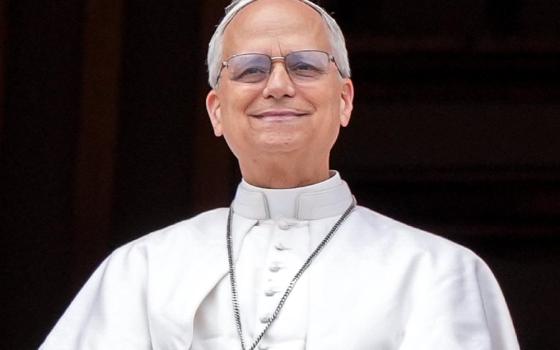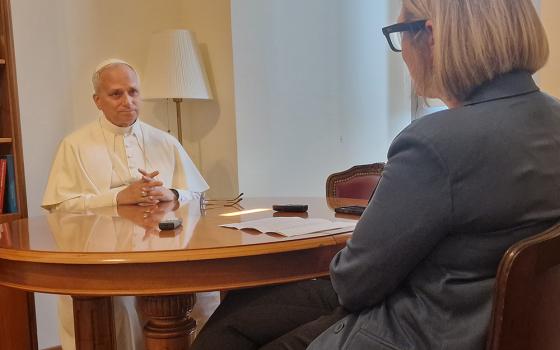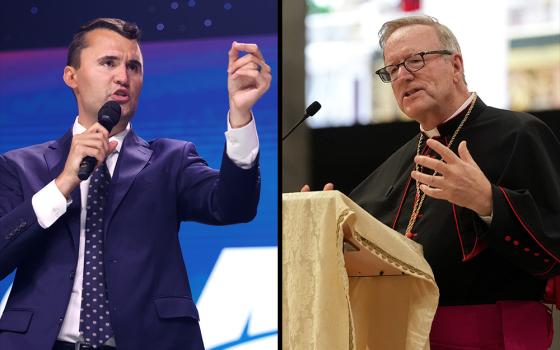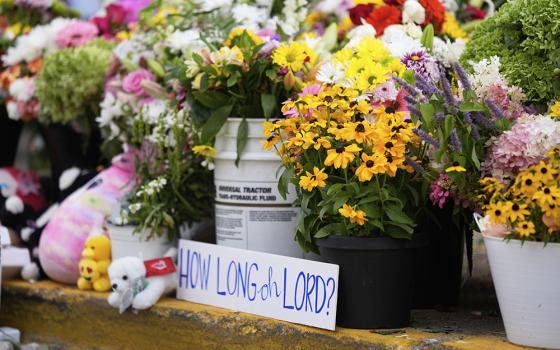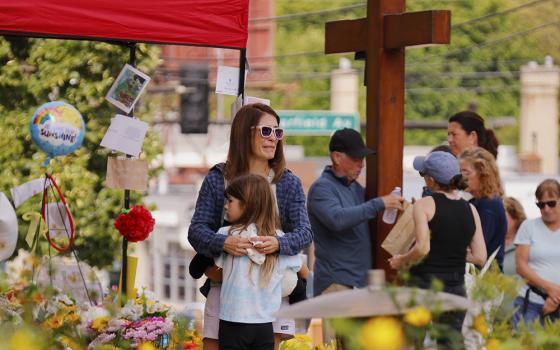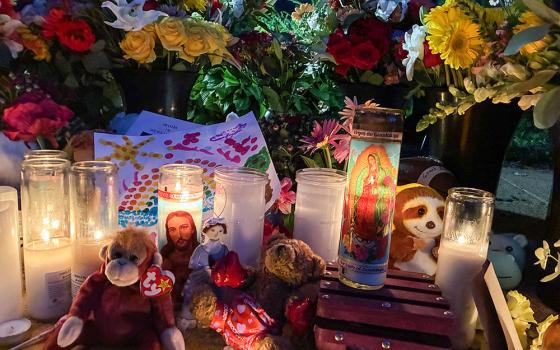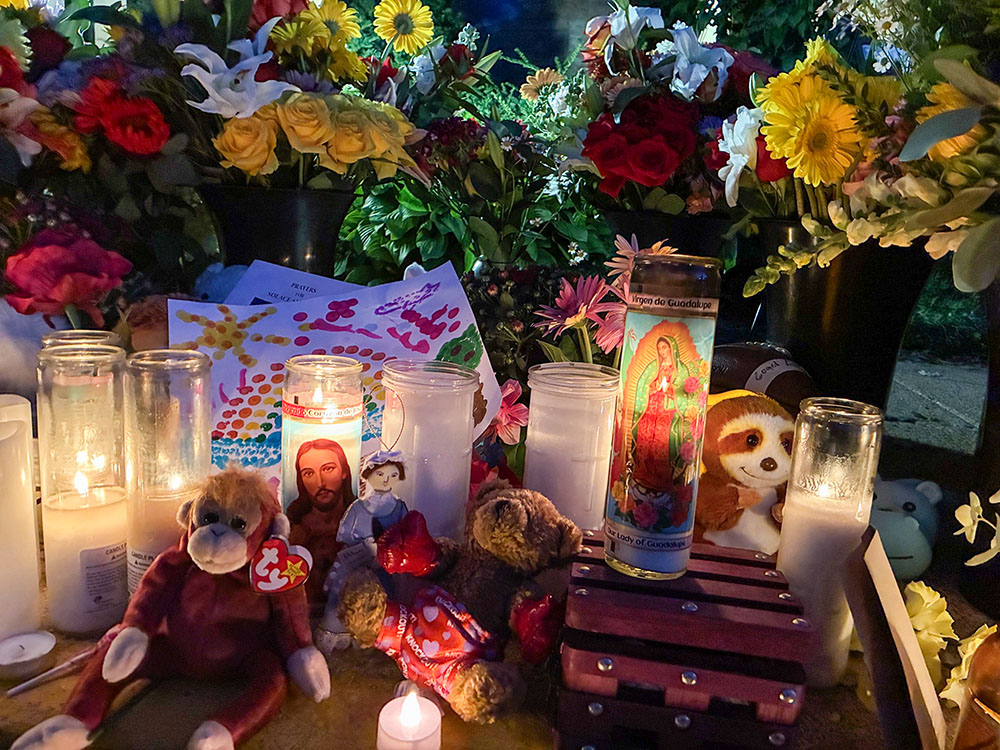
Candles, flowers and stuffed animals are seen in a community memorial outside Annunciation Catholic Church in Minneapolis Aug. 28, 2025. (OSV News/Maria Wiering)
Thoughts and prayers have become a battle line in the culture wars.
In the hours after the killing of two children and wounding 18 more kids and three adults at Assumption Catholic Church in Minneapolis, that city's mayor, Jacob Frey, said, "Don't just say this is about thoughts and prayers right now. These kids were literally praying!" The word "just" — he could have said "only" — exonerates the mayor from any suggestion he was belittling thoughts and prayers. He was saying they are not enough.
I do not censor those who, in the face of a tragedy, unsure of what to say, aware that no words can match the horror of the moment, turn to a well-worn expression, wishing thoughts and prayers to those affected by the tragedy. Pope Leo XIV expressed his "heartfelt condolences and the assurance of spiritual closeness" in a telegram to Archbishop Bernard Hebda of St. Paul-Minneapolis, and that sounds pretty close to "thoughts and prayers."
The Holy Father, however, in his Angelus address the following Sunday went beyond thoughts and prayers, saying, "Let us plead God to stop the pandemic of arms, large and small, which infects our world." Killings are not going to stop themselves. If we truly grieve the loss of these innocent children, shouldn't we at least consider making it more difficult for people to acquire the means used to kill them?
Never one to pass up a chance to engage the culture wars, Bishop Robert Barron of Winona-Rochester, Minnesota, condemned Frey's comments as "completely asinine." He continued: "Prayer is the raising of the mind and heart to God, which strikes me as altogether appropriate precisely at times of great pain. And prayer by no means stands in contrast to decisive moral action. Martin Luther King was a man of deep prayer, who also effected a social revolution in our country. This is not an either/or proposition." Again, the mayor's use of the qualifier "just" suggests he was making precisely the point Barron is making, that prayers and thoughts should prompt us to moral action.
To be fair, and to make sure I am not doing to Barron what he did to the mayor, the thing that set him off was Frey's comment about the children being at prayer when they were shot. Barron puts a negative construction on that sentence. I was not sure what the mayor meant. But a pastor should, when confronted with an ambiguous comment, reach out to the person before commenting. The culture of social media insists on immediate denunciation. The culture of the Catholic faith requires more than that.
Advertisement
I am not sure why Barron feels compelled to comment on every news cycle as if his is an authoritative voice on events and issues outside his diocese. He did the same at last summer's Olympic Games, complaining about a scene in the opening ceremonies that he believed mocked the Last Supper. Minneapolis has an archbishop; so does Paris. And Leo is the universal pastor of the church, not Barron. Barron simply can't resist culture war bait.
We now know, thanks to America's Colleen Dulle, that while he was still in Peru, Bishop Robert Prevost responded to the 2017 mass shooting in Las Vegas by retweeting a post by Connecticut Sen. Chris Murphy that stated: "To my colleagues: your cowardice to act cannot be whitewashed by thoughts and prayers. None of this ends unless we do something to stop it."
In any event, we have an even higher authority than Leo on the relationship of thoughts and prayers to moral action. We have the Letter of James in the New Testament, where we read: "What good is it, my brothers, if someone says he has faith but does not have works? Can that faith save him? If a brother or sister has nothing to wear and has no food for the day, and one of you says to them, 'Go in peace, keep warm, and eat well,' but you do not give them the necessities of the body, what good is it? So also faith of itself, if it does not have works, is dead" (2:14-17).
Those who are condemning those who ask for more than thoughts and prayers to stop the epidemic of gun violence in our land are not insulting the Christian religion. They are exhibiting it. Perhaps those who are quick to criticize the mayor in order to generate clicks on their social media accounts should consider another passage from the Letter of James: "No one experiencing temptation should say, 'I am being tempted by God'; for God is not subject to temptation to evil, and he himself tempts no one. Rather, each person is tempted when he is lured and enticed by his own desire" (1:13-14).
America's unwillingness to confront our cultural love affair with guns is difficult to fathom. It is like an addiction: It doesn't make sense from the outside but quitting is so hard to do. In the current, polarized climate, there will be no progress toward common sense solutions. It is frustrating, and more than thoughts and prayers will be needed to create the political will for change.
But let's stop beating each other up because of the words we use to express solidarity in the face of tragedy and, instead, start trying to persuade those who have bought into the gun manufacturers' propaganda that it is time to stop making an idol of the Second Amendment.

